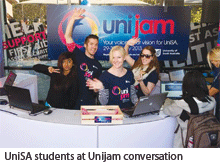When a fresh face enters a vice chancellor’s office, a revised strategic plan invariably emerges from under the door a few months later. But the University of South Australia’s new vice chancellor David Lloyd has decided to break with this closed-door tradition and instead host a giant 48-hour online brainstorming conversation about university strategy with any and all of the institution’s staff, students and alumni who care to take part. South Australia will thereby become the first university in the world to hold what it has dubbed a “Unijam”, which will use technology developed by IBM.
 Lloyd, who took over as vice chancellor and president in January, says he had first seen the technology used in-house at IBM while he was working in the pharmaceutical industry in 2004. “They were crowdsourcing ideas from 250,000 employees globally: it seemed such a sensible way to do it. I always wanted to try it so when the opportunity came up I jumped at it,” he says.
Lloyd, who took over as vice chancellor and president in January, says he had first seen the technology used in-house at IBM while he was working in the pharmaceutical industry in 2004. “They were crowdsourcing ideas from 250,000 employees globally: it seemed such a sensible way to do it. I always wanted to try it so when the opportunity came up I jumped at it,” he says.
The technology has since been launched commercially, and used by many organisations including Nato and the European Union. The Unijam, which was held on May 29-30, revolved around multiple two-hour text-based discussions on particular themes taking place in parallel — “like having a whole series of conferences going on at the same time”.
Speaking on the eve of the Unijam, Lloyd said there is potential for a “lot of noise”, but added that the technology will be able to filter the streams of thought in a “clever” way, with conversations data-mined in real time to highlight emerging themes and popular ideas. Participants will be able to indicate support for ideas using a system similar to Facebook ‘likes’, and it will be possible to identify the preferences of various cohorts.
Formerly the bursar and director of strategic innovation at Trinity College Dublin, Lloyd says he has also approached figures to drop in on conversations and “seed” new ideas. Invited guests range from business leaders and politicians such as South Australia’s premier Jay Weatherill to Coursera co-founder Andrew Ng and senior academics including Stanford University president John Hennessy.
Admitting that outcomes are not “fully controllable” and there could be “awkward” suggestions, Lloyd plans to make a distinction between popular no-cost or low-cost ideas that “we should just go ahead and do” and other longer-term plans that go beyond the exercise’s five-year purview.
(Excerpted and adapted from Times Higher Education)